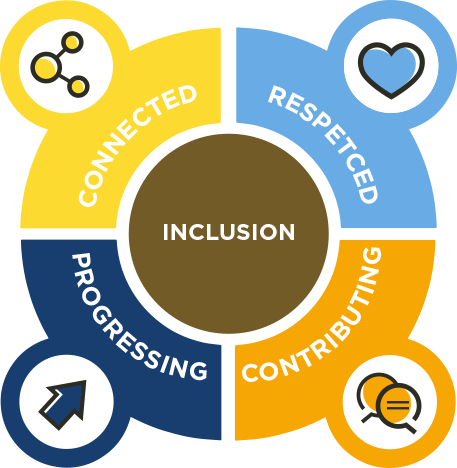DIVERSITY & INCLUSION EXPLAINED
BOLT CONSULT’S coaching programs & workshops are designed specifically to harness the strengths of all individuals and mitigate perceived biases that may have been formed, ensuring that the right people are focused on the right things, resulting in higher performing individuals and teams producing greater business outcomes.
Diversity refers to the mix of people in an organisation – that is, all the differences between people in how they identify in relation to their:
- SOCIAL IDENTITY e.g., Aboriginal and/or Torres Strait Islander background, age, caring responsibilities, cultural background, disability status, gender, religious affiliation, sexual orientation, gender identity, intersex status, and socio-economic background.
- PROFESSIONAL IDENTITY e.g., profession, education, work experiences, organisational level, functional area, division/ department, and location.
These aspects come together in a unique way for each individual and shape the way they view and perceive their world and workplace – as well as how others view and treat them.
Inclusion refers to getting the mix of people in an organisation to work together to improve performance and wellbeing. Inclusion in a workplace is achieved when a diversity of people (e.g., ages, cultural backgrounds, genders, perspectives) feel that they are:
- RESPECTED for who they are and able to be themselves;
- CONNECTED to their colleagues and feel they belong;
- CONTRIBUTING their perspectives and talents to the workplace; and
- PROGRESSING in their career at work (i.e. have equal access to opportunities and resources).
It is only through inclusion that organisations can make the most out of diversity.
The Diversity Council of Australia teamed up with Suncorp for the Inclusion@Work Index which surveyed 3000 working Australians. This survey found that inclusion at work matters to Australian workers as it:
Fueled Team Performance
Boosted Employee Satisfaction, Success & Security
Minimised the Risk of Harassment & Discrimination
Employers have a legal obligation and responsibility, not to discriminate against employees and to take ‘all reasonable steps’ to prevent discrimination, harassment, victimisation or bullying.
3 out of 4 Australian workers support or strongly support their organisation taking action to create a workplace which is diverse and inclusive
Only 3% oppose or strongly oppose their organisation taking action

Inclusion at work occurs when a diversity of people are respected, connected, progressing and contributing to organisational success.
Almost 1 in 2 Australians work in an inclusive team or for an inclusive manager
1 in 5 Australians has personally experienced harassment and/or discrimination at work in the past year
38% of Aboriginal and/or Torres Strait Islander Australians have personally experienced harrassment and/or discrimination in the past 12 months
INCLUSION AT WORK IS GOOD FOR BUSINESS
If you work in an inclusive team you are:
INCLUSION AT WORK IS GOOD FOR EMPLOYEES
If you work in an inclusive team you are:
EVEN A LITTLE INCLUSION AT WORK HELPS
Working in a somewhat inclusive team also boosts employee satisfaction, success and security, and a team performance – just to a smaller degree than working in a highly inclusive team
INCLUSION AT WORK BENEFITS EVERYONE
In organisations taking action to create a more diverse and inclusive workplace, a similar proportion of female and male workers were very satisfied with their jobs (43% women, 45% men) – and significantly more satisfied than men and women in organisations where no action was being taken (28% women, 23% men).
INCLUSION AT WORK MINIMISES HARASSMENT & DISCRIMINATION
If you work in an inclusive team, you are:
Almost 7 times less likely than workers in non-inclusive teams to have personally experienced harassment and/or discrimination in the past year.
1. Inclusive Teams = Respondents scored their team on average 4 or above out of 5 (where 5 = highly inclusive, 3 = neither inclusive or non-inclusive, 1 = not inclusive at all). Somewhat Inclusive Teams = Respondents scored their team on average between 3 and 4. Non-Inclusive Teams = Respondents scored their team on average less than 3.
2. Where we have indicated that inclusive teams/ leaders were “X times more likely” than non-inclusive teams/managers to be effective, innovative, stay etc. for ease of reading we have rounded up or down the original number to be a whole number (e.g. 9.7 times has been rounded up to 10 times).
3. Inclusive Managers = Respondents scored their manager on average 4 or above out of 5 (where 5 = highly inclusive, 3 = neither inclusive or non-inclusive, 1 = not inclusive at all).
